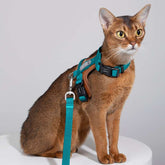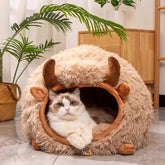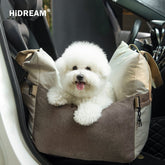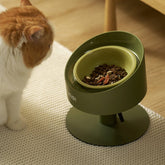All About Automatic Cat Litter Boxes

Are you sick and tired of constantly cleaning your cat's litter box and considering getting a self-cleaning litter box? And you're not sure if these products are any good. Rest assured, automatic litter boxes are not only a real thing but have come a long way in recent years. So if you're looking for a way to make your life easier when it comes to cleaning the litter box, a self-cleaning option may be the way to go.
What is an automatic litter box, and why is it helpful?
Easy maintenance
One of the key benefits of a self-cleaning litter box is that it is much easier to maintain than a traditional litter box. You won't have to scoop as often, and your kitty will always have a clean toilet to use.
An automatic cleaning system
The Automatic litter box helps reduce the amount of mess your cat makes. The litter is automatically raked into a special waste receptacle after each use, so there is less chance of it being tracked around the house or getting stuck in your cat's fur. It is a super easy way to keep your cat's bathroom clean.
Built-in detector for safety
Most litter boxes have sensors that detect when your cat has used the box and left. And a few minutes later, the cleaning cycle begins. A rake sifts through the soiled litter, collecting any clumps left by the cat and depositing them into a receptacle which then closes, containing the odors and clumps.
Odor removal
Another significant advantage is its ability to control odors much better than a traditional litter box. With a conventional litter tray, your cat’s waste will sit in the box until you scoop it up and throw it away. But a self-cleaning litter box will clean up after your cat immediately, sealing any waste in a separate, odor-neutralizing receptacle. (You’d still want to empty the waste receptacle regularly to keep odors to a minimum).
A self-cleaning cat litter box is an excellent solution for pet parents who want to avoid the hassle of constantly cleaning their cat's potty area. However, this doesn't mean you can simply turn it on and forget about it. Even though the litter box will clean itself, it's still important to do routine cleaning of the unit to ensure it's running effectively.
If you are looking for an easy-to-maintain litter box that will provide your cat with a clean toilet every time, then a self-cleaning litter box is a great option.

What to consider before purchasing one
Most self-cleaning litter boxes are enclosed, and some cats will not use a covered box. It's important to consider the needs and personality of your cat before making a purchase.
These kinds of self-cleaning litter boxes can be noisy when they're in the process of cleaning, which some cats may not be too fond of or may even get scared of. So, if you have a timid cat at home, check the product description of the self-cleaning litter box you're interested in to see if it has a quiet motor before making your final decision.
Additionally, some cats also have a more challenging time than others when it comes to covering their waste. If that's the case for your cat, then a self-cleaning litter box might not be the best option.
Another factor to consider is the cost. Self-cleaning litter boxes are typically much more expensive than conventional ones.
That being said, self-cleaning litter boxes are becoming very popular among the cat community. Now that you understand why there’s only one last question to ask: What will you be doing with all the time you save from not having to scoop cat litter every day?
Pros and cons of using the automatic litter box
The Pros
- Cats love a clean litter box and will go more often if it's constantly and consistently clean.
- A robot litter box cleaner will likely be more "on top of things" than us humans, so the frequency of clearing out cat waste will help encourage cats to use their boxes throughout the day.
- This also encourages sharing in multi-cat households - if you have a home with multiple cats, a self-cleaning litter box will enable them to share their box better.
- Cats typically won't want to use their litter box if their cat brothers and sisters leave waste behind.
- It's essential to have an effective odor control strategy for your litter box, and one of the best ways to do that is to keep it clean.
- If you're going to be away for a short period, you may not need to hire a cat sitter if you have a self-cleaning litter box paired with an automatic pet feeder
The Cons
- They can be pretty expensive. If you're on a budget, a traditional litter box might be a better option.
- You might have to buy additional supplies. Some self-cleaning litter boxes require you to purchase things like disposable trays, carbon filters, and cleaning cartridges. You might also need to use a specific type of litter.
- They're not perfect. Self-cleaning litter boxes are not 100% effective all the time. There may still be some scooping and cleaning required on your part.
- Some automatic litter boxes can require more setup than others.
- Size does matter. If you have a large cat, such as Maine Coon or Ragdoll, the limited space offered by automatic litter boxes might not be ideal.
- Additionally, some cats might be scared of self-cleaning litter boxes because they make noise and move around without a human. If your cat is skeptical about using it, try to think of it from their perspective and understand why they might be scared.
- That said, self-cleaning litter boxes still require some maintenance - at the end of the day, you will need to deep clean any and all litter boxes, even the self-cleaning ones. From time to time, you may also need to disinfect and reset your automatic litter box to ensure maximum cleanliness and odor-free.

Cleaning and maintenance
Cleaning
- It's important to scoop out your cat's litter box daily in order to keep them healthy and happy. How often you need to replace the litter itself depends on a few factors, such as the number of cats you have, the number of litter boxes you have and the type of litter you're using.
- For clay litter, a general guideline is to replace it twice a week. However, depending on your circumstances, you might need to replace it every other day or only once a week. If you're cleaning the litter box daily, you might only need to change clumping litter every two to three weeks.
- If you notice an odor or if much of the litter is wet or clumped, it's time to clean out the litter box. Scrub the box every time you change the litter, using mild dish detergent to clean it.
- Products with ammonia or citrus oils can turn a cat off, and some cleaning products are toxic to cats, so avoid using them.
Maintenance
Automatic litter boxes are not a new concept, and they have been around for quite some time now. But these automatic litter boxes tend to fail due to improper maintenance. Don't let your expensive automatic litter box become useless due to a lack of maintenance.
- You should be changing cat litter every two days - but if you're cleaning the box daily, you might only need to replace it every two to three weeks.
- When it comes to maintaining your cat's litter box, we recommend using an unscented and pet-safe cleaner spray or wipes. Cats are very sensitive to odors, many of which end up in cleaning products. If the litter box suddenly smells of a lingering fragrance that your cat hates, they probably won’t use it!
- If needed, clean the conveyor using a damp cloth or sponge.
- If you notice an ammonia smell coming from the litter box, that is a sign that you need to replace the litter. Ammonia is a strong odor and can be harmful to your cat if they are exposed to it for too long. If you notice the smell before it gets too strong, you can replace the litter and avoid any health problems for your cat.
A word of caution
It's important to find an automatic cat litter box that meets both your needs and your cat's comfort level. Some cats might be scared off by loud noises, so it might be best to get a litter box that runs quietly, or that has a delayed raking function. Other cats might prefer more space, so you'll want to look for an automatic litter box that's extra roomy. By finding a balance between your needs and your cat's preferences, you'll be able to find the best automatic cat litter box for your pet.
At the beginning of the transition, you might also want to observe your cat using the new machine to ensure safety. Make sure you choose one with a detector, which stops the machine from working when a cat enters.

Other alternatives
If you are still having second thoughts, some conventional litter boxes are still good options to consider:
Open Litter Boxes
Open litter boxes are the more commonly known style of litter box. They are typically cheaper and just as effective as other types of litter boxes, making them a great option if you need to buy multiple litter boxes for multiple cats. Some cats prefer open litter boxes because they can see everything that's going on around them and be on the lookout for any potential threats.
Cover Litter Boxes
Covered litter boxes come with a lid that does a decent job of containing odors, however, it's important to keep in mind that the lid makes it more difficult to clean the box. If your cat enjoys privacy, it might prefer a covered litter box over one that is out in the open.
Self-Cleaning Litter Boxes
Self-cleaning litter boxes can be a godsend for those who want to declutter their homes from traditional, manual litter boxes. These automated devices work by sifting and raking through the cat litter and collecting waste in a small compartment that you can easily empty out - however, it's important to note that your cat may take some time to acclimate to a self-cleaning litter box.
Disposable Litter Boxes
Disposable litter boxes provide a hygienic and convenient solution for cat parents who don't want to have to scoop or sift through the smelly, dirty litter. If you choose to use disposable litter boxes, look for those made of biodegradable materials that won't end up in landfills.
Sift Pan Litter Boxes
Sifting pan litter boxes are easy to clean because all you have to do is lift the first box and let the litter sift through the holes in the grate. This way, only the waste is left behind and not the clean litter.

Check this post to learn about the different types of litter boxes available in the market and this post for answers to common questions about picking the perfect one.























